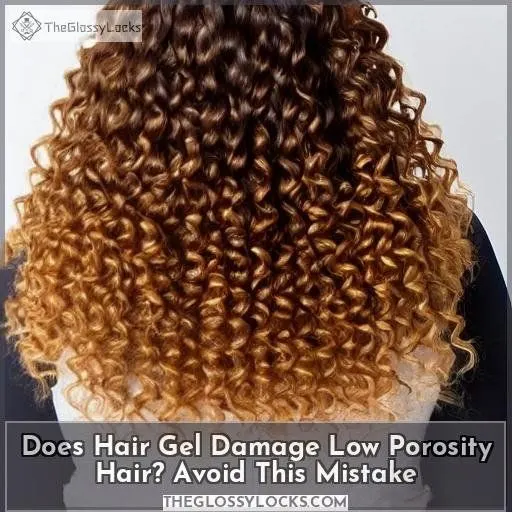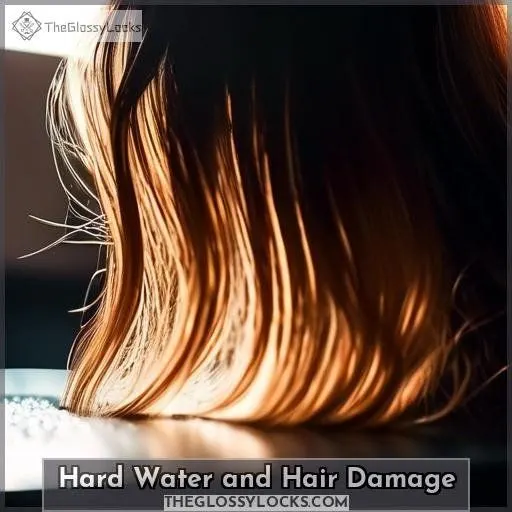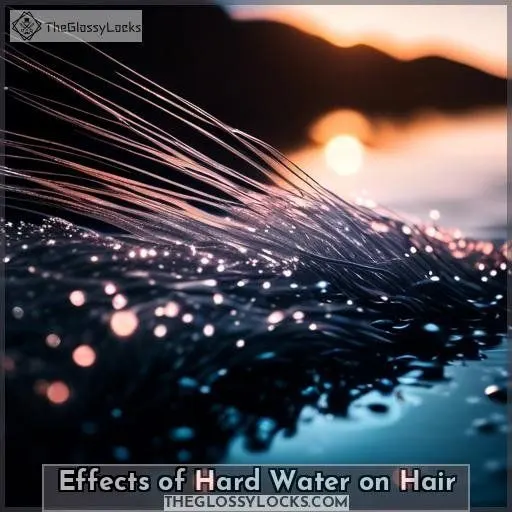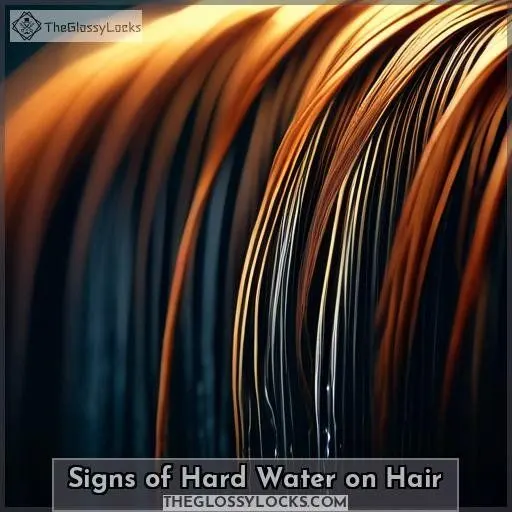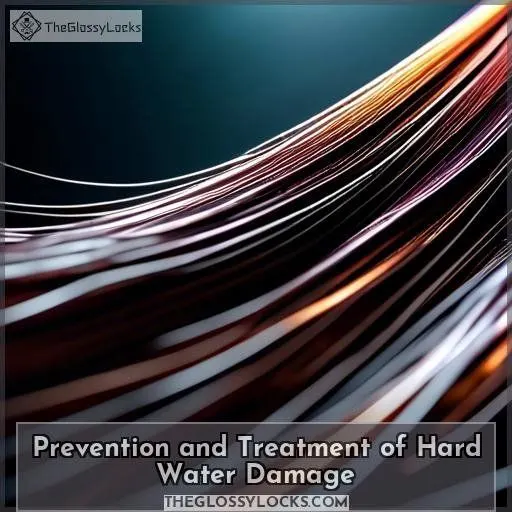This site is supported by our readers. We may earn a commission, at no cost to you, if you purchase through links.
Yes, hair gel can be quite problematic for those with low porosity hair. The ingredients in hair gel, particularly those that provide hold, can further dry out and damage your already moisture-deprived hair. Hair gel tends to be protein-rich, which can exacerbate the dryness and flatness often experienced by those with low porosity hair.
Instead, opt for lightweight, humectant-based styling products that won’t strip away essential moisture from your strands. By selecting the right products and maintaining a healthy hair care routine, you can combat the effects of hard water and keep your low porosity hair looking and feeling its best.
Table Of Contents
Key Takeaways
- Hair gel can be problematic for those with low porosity hair due to its protein-rich ingredients, which can further dry out and damage the already moisture-deprived hair.
- Hard water can wreak havoc on hair, causing damage, dryness, and dullness, especially in low porosity hair, which is more susceptible to product buildup and scalp irritation.
- To combat the effects of hard water and maintain healthy hair, use products with chelating ingredients that can help remove mineral buildup, and maintain a healthy hair care routine.
- Opt for lightweight, humectant-based styling products instead of hair gel, and avoid protein-rich products that can exacerbate dryness and flatness in low porosity hair.
Is Hair Gel Bad for Low Porosity Hair?
Yes, hair gel can be bad for low porosity hair. Low porosity hair has tightly packed cuticles that make it difficult for moisture to penetrate the hair shaft. Gel can further seal the cuticles, making it even harder for moisture to enter the hair. This can lead to dryness, frizz, and damage.
To care for low porosity hair, it’s recommended to use lightweight formulas, humectants, and penetrating ingredients. Proteins should be avoided, as they can make the hair more repellent to moisture and more brittle.
Hard Water and Hair Damage
Hard water can wreak havoc on your hair, causing damage and leaving it feeling dry, dull, and brittle. The minerals in hard water can bond to your hair strands, making them stiff, inflexible, and prone to breakage. This is especially problematic for low porosity hair, which is already more susceptible to product buildup and scalp irritation.
To prevent hard water damage, it’s imperative to use products with chelating ingredients that can help remove mineral buildup. Regular hair care, including rinsing with warm water and using clarifying treatments, can also help keep your hair healthy and strong.
Effects of Hard Water on Hair
Hard water can wreak havoc on your hair, leaving it dry, dull, and prone to breakage. Minerals in hard water can build up on your strands, compromising the health and appearance of your locks.
Dryness and Dullness
Hard water can cause dryness and dullness in your hair, making it feel stiff, inflexible, and brittle. This is due to the dissolved minerals in hard water, such as calcium and magnesium, bonding to your hair strands.
Protein-rich hair products, like Eco Styler Krystal Gel, can exacerbate this issue, causing dryness and flatness in low porosity hair. To combat this, use chelating ingredients like disodium EDTA, tetrasodium EDTA, or sodium phytate, and consider trying protein-free gels.
Regular hair care with clarifying treatments, like Ion Color Solutions Crystal Clarifying Treatment, can also help maintain healthy, hydrated hair.
Hair Loss and Breakage
Hard water can lead to hair loss and breakage, especially in low porosity hair. The minerals in hard water can bond to hair strands, making them stiff, inflexible, and prone to damage.
Hair gel, which often contains protein, can exacerbate these issues by causing dryness and flatness in low porosity hair. To combat this, consider using products with chelating ingredients or switching to a protein-free gel.
Additionally, regular hair care, such as using a crystal clarifying treatment, can help maintain hair health.
Scalp Issues
Hard water can significantly affect your hair’s well-being, especially with respect to scalp concerns. Here are five key aspects to keep in mind:
Scalp Accumulation: Hard water can leave a mineral residue on your scalp, which inhibits moisture absorption and can lead to the accumulation of dead skin cells and sebum.
Scalp Discomfort: The minerals in hard water can irritate your scalp, causing itching, flaking, and dandruff.
Scalp Dehydration: The film left by hard water can prevent your scalp from absorbing moisture, leading to dryness.
Scalp Susceptibility: Some individuals may experience heightened sensitivity on their scalp due to exposure to hard water.
Scalp Condition: Over time, the accumulation of minerals and dead skin cells can negatively impact the overall condition of your scalp.
To alleviate these concerns, consider using products specifically formulated for hard water, such as the Ion Purify Hard Water Shampoo and Conditioner, which contain chelating agents that help eliminate mineral buildup. Additionally, regular hair care, including deep conditioning treatments, can help maintain the health of your scalp and hair.
Signs of Hard Water on Hair
Are your hair strands feeling stiff and inflexible? Dull and brittle hair could be a telltale sign that hard water is wreaking havoc on your locks.
Hair Dryness
If you’re dealing with low porosity hair, be cautious when using hair gel products. Many contain protein, which can cause dryness and flatness in your hair. For example, Eco Styler Krystal Gel has wheat protein as the third ingredient.
If you’ve noticed dryness, breakage, or a lack of moisture balance, it might be time to switch to a protein-free gel. Regularly assess your hair’s needs and adjust your product choices accordingly.
Hair Loss and Thinning
Hard water can lead to hair loss and thinning. The high mineral content in hard water, such as calcium and magnesium, can cause a build-up on the scalp, which clogs hair follicles and inhibits hair growth. This build-up can also make hair brittle and prone to breakage, contributing to the appearance of hair loss.
To prevent hard water damage, consider using chelating products that contain ingredients like EDTA or Ethylenediaminetetraacetic acid, which help remove mineral build-up from the hair. Additionally, maintaining a healthy hair care routine, including regular shampooing and conditioning, can help keep hair strong and prevent damage.
Prevention and Treatment of Hard Water Damage
Have you noticed your hair feeling dry and brittle lately? To prevent and treat hard water damage, look for hair products containing chelating ingredients like EDTA that can remove mineral buildup. Regular deep cleansing with a clarifying treatment can also revive your strands.
Chelating Ingredients
Chelating ingredients, such as EDTA, can help prevent and treat hard water damage. These substances bind to minerals in hard water, preventing them from bonding to hair strands. By using hair products with chelating agents, you can maintain the health of your low porosity hair and avoid the negative effects of hard water.
Incorporating chelators into your hair care routine can be a game-changer for those dealing with hard water issues.
Regular Hair Care
After diving into the science of chelating ingredients, let’s not forget the bread and butter of hair care. Regular maintenance is your secret weapon against hard water havoc.
- Swap out your gel brands wisely, considering their protein content and your hair’s porosity.
- Keep an eye out for product recommendations that cater specifically to your hair type.
- Remember, preventing hair damage starts with the right routine.
Frequently Asked Questions (FAQs)
How does hard water affect hair gel?
Hard water’s mineral deposits can cling to your hair, making gel feel stiff and flaky. Opt for clarifying products with chelating agents to banish buildup and let your gel work its magic without a hitch.
Can low porosity hair use hair gel?
You can use hair gel if you have low porosity hair, but steer clear of protein-rich formulas. Opt for lightweight, protein-free gels to avoid dryness and flatness. With the right gel, you can achieve defined, frizz-free curls.
What are alternatives to hair gel for low porosity hair?
For low porosity hair, opt for lightweight, protein-free stylers like leave-in conditioners, curl creams, or oils. Steer clear of heavy, gel-based products that can weigh down and dry out your delicate strands. Your curls will thank you!
How can I prevent hard water damage?
To prevent hard water damage, use clarifying products with chelating agents like EDTA. They’ll banish mineral buildup, leaving your strands soft, strong, and healthy. Try an at-home hard water treatment every few weeks for best results.
What are the best products for hard water hair?
Kick hard water’s butt with Ion’s clarifying duo – the Purify Shampoo and Conditioner. They use chelating agents to dissolve mineral buildup, leaving your locks silky-smooth and manageable. Treat yourself every few weeks for hair heaven!
Conclusion
Evidently, hair gel is the bane of low porosity hair. It’s like dousing your strands in cement – they’ll be stiff, lifeless, and completely devoid of moisture. Don’t fall for this trap, folks.
Instead, opt for lightweight, humectant-based styling products that’ll quench your hair’s thirst without stripping it bare. Steer clear of hair gel if you want to keep your low porosity hair healthy, hydrated, and oh-so-lively.
After all, is hair gel bad for low porosity hair? The answer is a resounding yes.

